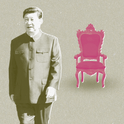Most commentators and politicians were taken by surprise by the recent challenges to globalisation. But at least they seem prepared to ask questions about its relevance. Martin Wolf, in his critique of my book The Silent Takeover in the July Prospect, doesn't even register a query about it. He concedes that there are certain issues that need be addressed such as "how to secure the protection of the global commons," and "the regulation of an integrating global economy"; but stops short of doing so. My book is about these matters.
The Silent Takeover seeks to examine the changing nature of power in the global economy and to explore the growth of non-traditional forms of politics. By dismissing the relevance of this investigation, Wolf proves himself to be a man out of touch. In Wolfland: "states tax and regulate, companies buy and sell." If only it were so simple.
Wolf misrepresents me when he claims that I say that corporations dominate the world. Of course nation states can still rule within their territories-but their freedom is increasingly constrained by the need to cater for the interests of big business.
Take the WTO. Time and again it has intervened to prevent governments from using sanctions against companies that they found to be acting unacceptably. When the EU tried to ban synthetic hormones from beef on the basis of strong evidence that they cause cancer, it found itself unable to do so thanks to a WTO ruling which put the interests of Monsanto and the US Dairy Export Council first.
In Wolfland, it is heretical to talk of corporations as powerful. He will have none of my comparing the power of nations to that of corporations. "Apples and artichokes," he says. Not very helpful. For this is what the debate is about: the changing balance of power between economic and political forces.
The increased mobility of capital has increased "exit options" for corporations, while the positions of the state and of labour remain relatively static. The balance of power between these agencies and institutions has shifted. As Hans Tietmeyer, former president of the Bundesbank, said "Politicians have to understand that they are now under the control of the financial markets and not... of national debates."
Perhaps it is because he only talks to like-minded people that Wolf seems unaware of what is going on. For in Wolfland nation states remain firmly in control. "There is no economic force preventing most internationally integrated market economies from raising taxes," sayeth he. A view not shared by the Singaporean Ministry of Finance, which in its 2001 budget report explains its cut in corporate taxes by "the need for Singapore to keep up with the global trend of falling corporate tax rates." Nor borne out by the facts that the average corporate tax rate in OECD countries has fallen by nearly 3.5 per cent since 1996; that corporate tax rates of US affiliates operating in developing countries dropped from 54 per cent to 28 per cent between 1983 and 1996; or that the report to the EU summit in December 1999 found that all EU states (except Sweden) engaged in some form of tax competition.
In fact the only evidence that Wolf provides to counter the charge of downward pressure on corporate tax rates-that such taxes rose as a percentage of total taxation in most OECD countries between 1980 and 1999-does nothing of the sort. The corporate tax take has been going up not because nations are making greater demands on business but because economies have been growing over the past few years and there are more profits to collect taxes from. Corporate tax revenues have gone up, but corporate tax rates continue to be pushed down.
The pressures on regulations and wages are not so uniform but are also there: why else are US factories shifting to the maquiladora plants on the Mexican border where nearly 1m people are employed at wages of under $5 a day? Wolf attempts to dismiss the appeal to business of low wage, low regulation regimes by citing the statistic that shows that only a quarter of foreign direct investment (FDI) in 1999 went into the developing world. This argument has several flaws. First, if merger and acquisition (M&A) transactions were stripped from the FDI figure, we would see a much higher proportion of investment going into the third world. Two M&A deals accounted for almost 50 per cent of British FDI outflows in 1999. Second, what is important here is not FDI stock but FDI flows-looking at these we see that investment into the developing world has grown over the past 20-odd years from an average of $2.35 billion in the early 1970s to $80 billion in the period 1991 to 1996. Third, $1m invested in a developing country will be worth far more to that host government than the same amount invested in a developed country. Third world governments will lower standards and taxes if this makes them more likely to attract investment.
With regard to the effects of inward investment, Wolf thinks the matter can be closed by pointing to the positive outcomes for those employed in the foreign firms. The claim itself is unsurprising-I make it myself. But again Wolf evades the point. The point is not that inward investment cannot make people of recipient countries better off. It is why there is not a bigger "trickle down" effect. Why is globalisation-to quote James Wolfensohn, head of the World Bank-"not working at the level of the people?" Why has the number of people living on less than $1 a day increased over the past 20 years in every developing country outside East Asia? What are the implications of the fact that, while inequality declined in most countries between 1946 and 1975, since the Washington consensus came to dominate policy there has been a reversal of this trend everywhere?
Capitalism cannot solve the problems it creates. But Wolf thinks the market can sort it all out. He ridicules my belief in representative democracy as "naive" and claims I am unaware of the public choice theorists. This is absurd. Of course any form of political power that is not accountable is potentially dangerous. But my book isn't about this, it is about the way politicians are increasingly seen as unable to protect the public realm.
There are no simple solutions. I have stressed that the protest movement, while important, is not a long-term solution-it is not representative. The issues it has raised must now be taken up in representative forums.
By proving unwilling to honestly engage in the debate, Wolf reveals that he is part of the problem. That someone attached to one of the world's great newspapers should offer such a slipshod review is, to coin a phrase, "depressing beyond words." n











